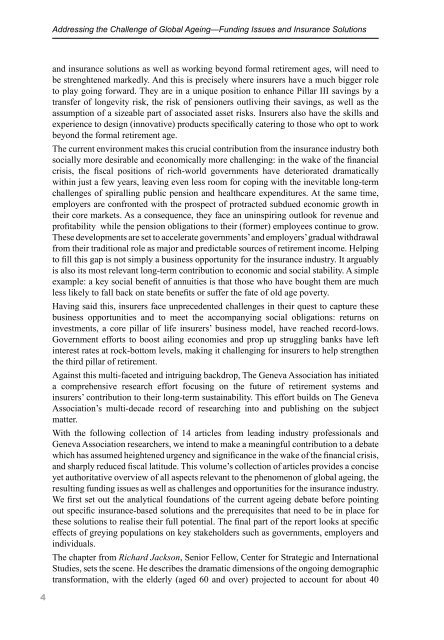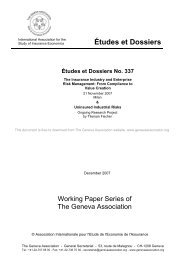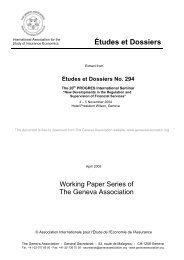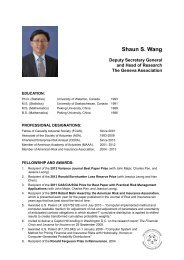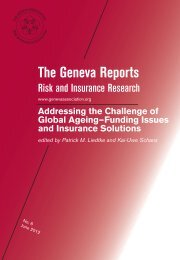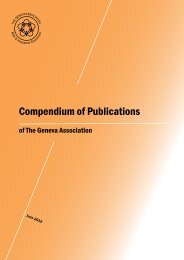Addressing the Challenge of Global Ageing—Funding Issues
Addressing the Challenge of Global Ageing—Funding Issues
Addressing the Challenge of Global Ageing—Funding Issues
You also want an ePaper? Increase the reach of your titles
YUMPU automatically turns print PDFs into web optimized ePapers that Google loves.
4<br />
<strong>Addressing</strong> <strong>the</strong> <strong>Challenge</strong> <strong>of</strong> <strong>Global</strong> Ageing—Funding <strong>Issues</strong> and Insurance Solutions<br />
and insurance solutions as well as working beyond formal retirement ages, will need to<br />
be strenghtened markedly. And this is precisely where insurers have a much bigger role<br />
to play going forward. They are in a unique position to enhance Pillar III savings by a<br />
transfer <strong>of</strong> longevity risk, <strong>the</strong> risk <strong>of</strong> pensioners outliving <strong>the</strong>ir savings, as well as <strong>the</strong><br />
assumption <strong>of</strong> a sizeable part <strong>of</strong> associated asset risks. Insurers also have <strong>the</strong> skills and<br />
experience to design (innovative) products specifically catering to those who opt to work<br />
beyond <strong>the</strong> formal retirement age.<br />
The current environment makes this crucial contribution from <strong>the</strong> insurance industry both<br />
socially more desirable and economically more challenging: in <strong>the</strong> wake <strong>of</strong> <strong>the</strong> financial<br />
crisis, <strong>the</strong> fiscal positions <strong>of</strong> rich-world governments have deteriorated dramatically<br />
within just a few years, leaving even less room for coping with <strong>the</strong> inevitable long-term<br />
challenges <strong>of</strong> spiralling public pension and healthcare expenditures. At <strong>the</strong> same time,<br />
employers are confronted with <strong>the</strong> prospect <strong>of</strong> protracted subdued economic growth in<br />
<strong>the</strong>ir core markets. As a consequence, <strong>the</strong>y face an uninspiring outlook for revenue and<br />
pr<strong>of</strong>itability while <strong>the</strong> pension obligations to <strong>the</strong>ir (former) employees continue to grow.<br />
These developments are set to accelerate governments’ and employers’ gradual withdrawal<br />
from <strong>the</strong>ir traditional role as major and predictable sources <strong>of</strong> retirement income. Helping<br />
to fill this gap is not simply a business opportunity for <strong>the</strong> insurance industry. It arguably<br />
is also its most relevant long-term contribution to economic and social stability. A simple<br />
example: a key social benefit <strong>of</strong> annuities is that those who have bought <strong>the</strong>m are much<br />
less likely to fall back on state benefits or suffer <strong>the</strong> fate <strong>of</strong> old age poverty.<br />
Having said this, insurers face unprecedented challenges in <strong>the</strong>ir quest to capture <strong>the</strong>se<br />
business opportunities and to meet <strong>the</strong> accompanying social obligations: returns on<br />
investments, a core pillar <strong>of</strong> life insurers’ business model, have reached record-lows.<br />
Government efforts to boost ailing economies and prop up struggling banks have left<br />
interest rates at rock-bottom levels, making it challenging for insurers to help streng<strong>the</strong>n<br />
<strong>the</strong> third pillar <strong>of</strong> retirement.<br />
Against this multi-faceted and intriguing backdrop, The Geneva Association has initiated<br />
a comprehensive research effort focusing on <strong>the</strong> future <strong>of</strong> retirement systems and<br />
insurers’ contribution to <strong>the</strong>ir long-term sustainability. This effort builds on The Geneva<br />
Association’s multi-decade record <strong>of</strong> researching into and publishing on <strong>the</strong> subject<br />
matter.<br />
With <strong>the</strong> following collection <strong>of</strong> 14 articles from leading industry pr<strong>of</strong>essionals and<br />
Geneva Association researchers, we intend to make a meaningful contribution to a debate<br />
which has assumed heightened urgency and significance in <strong>the</strong> wake <strong>of</strong> <strong>the</strong> financial crisis,<br />
and sharply reduced fiscal latitude. This volume’s collection <strong>of</strong> articles provides a concise<br />
yet authoritative overview <strong>of</strong> all aspects relevant to <strong>the</strong> phenomenon <strong>of</strong> global ageing, <strong>the</strong><br />
resulting funding issues as well as challenges and opportunities for <strong>the</strong> insurance industry.<br />
We first set out <strong>the</strong> analytical foundations <strong>of</strong> <strong>the</strong> current ageing debate before pointing<br />
out specific insurance-based solutions and <strong>the</strong> prerequisites that need to be in place for<br />
<strong>the</strong>se solutions to realise <strong>the</strong>ir full potential. The final part <strong>of</strong> <strong>the</strong> report looks at specific<br />
effects <strong>of</strong> greying populations on key stakeholders such as governments, employers and<br />
individuals.<br />
The chapter from Richard Jackson, Senior Fellow, Center for Strategic and International<br />
Studies, sets <strong>the</strong> scene. He describes <strong>the</strong> dramatic dimensions <strong>of</strong> <strong>the</strong> ongoing demographic<br />
transformation, with <strong>the</strong> elderly (aged 60 and over) projected to account for about 40


